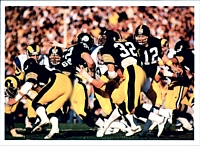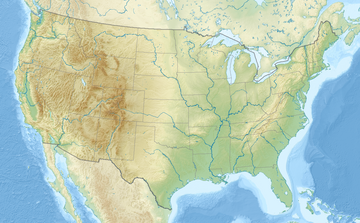Draft
The 1979 NFL Draft was held from May 3 to 4, 1979 at New York City's Waldorf Astoria New York. With the first pick, the Buffalo Bills selected linebacker Tom Cousineau from the Ohio State University.
New officials
Jerry Seeman was promoted to referee succeeding Don Wedge who returned to being a deep wing official, primarily as a back judge (now field judge), where he continued to officiate through 1995. Seeman served as a crew chief for 12 seasons, working Super Bowl XXIII and Super Bowl XXV before leaving the field to succeed Art McNally as NFL Vice President of Officiating from 1991 to 2001.
Division Races
Starting in 1978, ten teams qualified for the playoffs: the winners of each of the divisions, and two wild-card teams in each conference.
| Week
|
NFC East
|
|
NFC Central
|
|
NFC West
|
|
Wild Card
|
|
Wild Card
|
|
| 1
|
Dallas, Philadelphia
|
1–0
|
3 teams
|
1–0
|
Atlanta
|
1–0
|
|
|
|
|
| 2
|
Dallas
|
2–0
|
Tampa Bay, Chicago
|
2–0
|
Atlanta
|
2–0
|
|
|
|
|
| 3
|
Dallas
|
3–0
|
Tampa Bay
|
3–0
|
Atlanta, L.A.
|
2–1
|
|
|
|
|
| 4
|
Dallas, Philadelphia, Washington
|
3–1
|
Tampa Bay
|
4–0
|
Atlanta, L.A.
|
2–2
|
Chicago
|
2–2
|
Minnesota
|
2–2
|
| 5
|
Dallas, Philadelphia, Washington
|
4–1
|
Tampa Bay
|
5–0
|
L.A.
|
3–2
|
Minnesota
|
3–2
|
4 teams
|
2–3
|
| 6
|
Dallas, Philadelphia
|
5–1
|
Tampa Bay
|
5–1
|
L.A.
|
4–2
|
Washington
|
4–2
|
3 teams
|
3–3
|
| 7
|
Dallas, Philadelphia
|
6–1
|
Tampa Bay
|
5–2
|
L.A.
|
4–3
|
Washington
|
5–2
|
5 teams
|
3–4
|
| 8
|
Dallas
|
7–1
|
Tampa Bay
|
6–2
|
L.A., New Orleans
|
4–4
|
Philadelphia, Washington
|
6–2
|
Minnesota
|
4–4
|
| 9
|
Dallas
|
7–2
|
Tampa Bay
|
7–2
|
New Orleans
|
5–4
|
Philadelphia, Washington
|
6–3
|
4 teams
|
4–5
|
| 10
|
Dallas
|
8–2
|
Tampa Bay
|
7–3
|
L.A., New Orleans
|
5–5
|
Philadelphia, Washington
|
6–4
|
Chicago
|
5–5
|
| 11
|
Dallas
|
8–3
|
Tampa Bay
|
8–3
|
New Orleans
|
6-5
|
Philadelphia, Washington
|
7–4
|
Chicago
|
6–5
|
| 12
|
Dallas, Philadelphia, Washington
|
8–4
|
Tampa Bay
|
9–3
|
L.A., New Orleans
|
6–6
|
Chicago
|
7–5
|
Giants, Minnesota
|
5–7
|
| 13
|
Philadelphia
|
9–4
|
Tampa Bay
|
9–4
|
L.A., New Orleans
|
7–6
|
Dallas, Washington
|
8–5
|
Chicago
|
7–6
|
| 14
|
Philadelphia
|
10–4
|
Tampa Bay
|
9–5
|
L.A.
|
8–6
|
Dallas, Washington
|
9–5
|
Chicago
|
8–6
|
| 15
|
Dallas, Philadelphia, Washington
|
10–5
|
Tampa Bay, Chicago
|
9–6
|
L.A.
|
9–6
|
Minnesota, New Orleans
|
7–8
|
Giants
|
6–9
|
| 16
|
Dallas
|
11–5
|
Tampa Bay
|
10–6
|
Los Angeles
|
9–7
|
Philadelphia
|
11–5
|
Chicago
|
10–6
|
| Week
|
AFC East
|
|
AFC Central
|
|
AFC West
|
|
Wild Card
|
|
Wild Card
|
|
| 1
|
Miami
|
1–0
|
3 teams
|
1–0
|
4 teams
|
1–0
|
|
|
|
|
| 2
|
Miami
|
2–0
|
Pittsburgh, Cleveland
|
2–0
|
San Diego
|
2–0
|
|
|
|
|
| 3
|
Miami
|
3–0
|
Pittsburgh, Cleveland
|
3–0
|
San Diego
|
3–0
|
3 teams
|
2–1
|
|
|
| 4
|
Miami
|
4–0
|
Pittsburgh, Cleveland
|
4–0
|
San Diego, Denver
|
3–1
|
New England, Houston
|
3–1
|
Buffalo, Kansas City
|
2–2
|
| 5
|
Miami
|
4–1
|
Pittsburgh, Cleveland, Houston
|
4–1
|
San Diego
|
4–1
|
4 teams
|
3–2
|
Jets, Oakland
|
2–3
|
| 6
|
Miami, N.E.
|
4–2
|
Pittsburgh
|
5–1
|
S.D., Denver, Kansas City
|
4–2
|
Cleveland, Houston
|
4–2
|
Buffalo, Oakland
|
3–3
|
| 7
|
Miami, N.E.
|
5–2
|
Pittsburgh, Houston
|
5–2
|
San Diego, Denver
|
5–2
|
3 teams
|
4–3
|
Buffalo, Jets
|
3–4
|
| 8
|
New England
|
6–2
|
Pittsburgh
|
6–2
|
San Diego
|
6–2
|
4 teams
|
5–3
|
3 teams
|
4–4
|
| 9
|
Miami, N.E.
|
6–3
|
Pittsburgh
|
7–2
|
San Diego, Denver
|
6–3
|
Cleveland, Houston
|
6–3
|
Oakland
|
5–4
|
| 10
|
New England
|
7–3
|
Pittsburgh
|
8–2
|
Denver
|
7–3
|
Houston
|
7–3
|
Cleveland, San Diego
|
7-3
|
| 11
|
New England
|
7–4
|
Pittsburgh
|
9–2
|
Denver
|
8–3
|
Houston
|
8–3
|
San Diego
|
8-3
|
| 12
|
New England
|
8–4
|
Pittsburgh
|
9–3
|
Denver
|
9–3
|
Houston
|
9-3
|
San Diego
|
9-3
|
| 13
|
New England
|
8–5
|
Pittsburgh
|
10–3
|
San Diego
|
10–3
|
Houston
|
10-3
|
Denver
|
9-4
|
| 14
|
Miami
|
9–5
|
Pittsburgh
|
11–3
|
Denver
|
10–4
|
Houston, San Diego
|
10–4
|
Houston, San Diego
|
10-4
|
| 15
|
Miami
|
10–5
|
Houston
|
11–4
|
San Diego
|
11–4
|
Pittsburgh
|
11–4
|
Denver
|
10-5
|
| 16
|
Miami
|
10–6
|
Pittsburgh
|
12–4
|
San Diego
|
12–4
|
Houston
|
11–5
|
Denver
|
10–6
|
Television
This was the second year under the league's four-year broadcast contracts with ABC, CBS, and NBC to televise Monday Night Football, the NFC package, and the AFC package, respectively.
Fran Tarkenton began serving as a fill-in color commentator for ABC, while Bryant Gumbel became the sole host of NBC's pregame show NFL '79.[4]
Dick Enberg and Merlin Olsen replaced Curt Gowdy and John Brodie as NBC's lead commentary team. Rather than demote Gowdy, NBC traded him away to CBS for Don Criqui. With Pat Summerall and Tom Brookshier remaining as CBS' lead commentary team, and Vin Scully and George Allen as the #2 team, Gowdy was paired with Hank Stram as the network's #3 team.[5]
John Madden, who retired as Oakland Raiders coach following the previous season, was hired by CBS. He remained with CBS through 1993, when it lost the NFC package to FOX.


